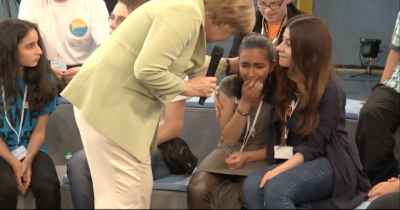The Brutality of European Migration Policy: Not Everyone Is Allowed to Have a ‘Good Life in Germany’

Image: Angela Merkel consoles 14-year old Reem Sahwil after bringing her to tears when explaining Germany’s need to deport asylum seekers. (Photo: Gut Leben/Newsweek Europe)
Since a video went viral yesterday showing the German Chancellor Angela Merkel getting questioned from school kids as part of the government’s programme “Gut Leben in Deutschland” (Good Life in Germany), the brutality and hardship of European migration policy became a little more visible by what one of these kids had so say.
The PR-disaster was caused by Reem, a Palestinian girl who fled a refugee camp in Lebanon with her family four years ago and now faces deportation.
She told Merkel in fluent German
: “As long as I don’t know how long I can stay here, I don’t know what my future will be. I really want to study in Germany. It is really unpleasant to look on how others can really enjoy life while oneself can’t enjoy it with them.”
Whereas Merkel replied:
“I understand, however, I have to… politics is sometimes hard. You’re a very nice person but you know that there are thousands and thousands of people in Palestinian refugee camps in Lebanon and if I say ‘you can all come,’ (…) we just can’t manage that.”
After she continued defending the government’s asylum policy, Reem burst into tears and got stroked by Merkel, what has gone viral on Twitter as #merkelstreichelt (Merkel strokes) and her apparent lack of empathy got slammed and criticized since.
Reem’s family had only been granted temporary right of asylum and since Lebanon is not regarded a country at civil war by German authorities, it is lawful to deport them back.
Unfortunately, the entire German news coverage is leaving out the fact that this refugee camp Reem is supposed to be sent back to is not her home. At least some newspapers think it is worth mentioning that she is originally Palestinian. And her story is one out of 1.5 million (and that is only one-third of registered refugees according to UNRWA statistics) stories of Palestinians who have been displaced and are currently living in refugee camps all over Jordan, Lebanon, the Gaza Strip and the West Bank, including East Jerusalem, as well as Syria, partially under degrading and cruel conditions. Conditions Ms. Merkel can – judging from her reaction – not even imagine.
But no matter how much one can criticize Merkel’s behaviour, it is nevertheless an honest one.
The scene reflects a perfect microcosm of Germany’s rigid migration policy and the Ivory tower European leadership is talking down from. Reem is, as was pointed out, just one of thousands and thousands of refugees and one of millions of displaced Palestinians – an issue the German government fails to deal with since it conflicts with the Chancellor’s raison d’état.
It might not only be time to rethink German asylum policy, but also to take the country’s gridlocked position on foreign affairs into reconsideration which contributes to the situation people find themselves in.

